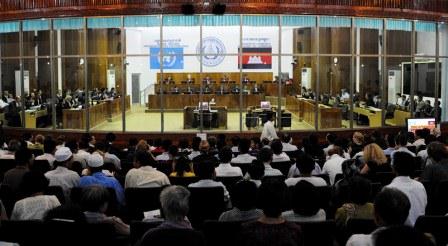At the ECCC
Being the only institution currently to prosecute crimes of the Khmer Rouge era, the ECCC are the sole institution to prosecute all forms of GBV that occurred between 17 April 1975 and 7 January 1979. This has happened to a certain extent in the initial two cases.
To download background papers on the prosecution of GBV at the ECCC go to Outreach and Advocacy.
CASE 001:
Rape as a form of torture was acknowledged as a crime against humanity among the crimes Duch was convicted of.
Judgement against KAING Guek Eav alias Duch, 26 July 2010, Paragraph 246: “The Amended Closing Order also alleges that there is evidence of at least one incident of rape at S-21. The Accused acknowledged that an S-21 staff member inserted a stick into the vagina of a detainee during an interrogation. He stated that he had a strong emotional reaction to this incident, but that he did not want to show his anger to his superiors and subordinates. He further stated that he did not know that this constituted a crime and treated the incident as any other violation of the regulation of torture. He reported the incident to his superior but did not get any response. As a result, he reassigned the interrogator, who was no longer allowed to interrogate female taken against the perpetrator. The Chamber is satisfied that this allegation of rape has been proved to the required standard.”
Another account of rape at S-21, the main crime site for case 001, was not considered due to the fact that the evidence was revealed after the final indictment and in the midst of the main trial. To safeguard the accused’s rights to a fair trial, the proposal of evidence at that stage was not permitted.
CASE 002:
Charges of Forced Marriage
Due to the efforts of Civil Party Lawyers, the Office of the Co-Investigating Judges at the ECCC started investigating the crime of forced marriage in 2009, and eventually included it the indictment under the 5th policy of the Khmer Rouge as “regulation of marriage.”
The initial characterization of forced marriage as rape and other inhumane act under crimes against humanity was modified upon appeal by the defense. At this stage, this set of facts is solely charged as other inhumane act based on the argument that rape was not yet recognized as international crime between 1975 and 1979. The Trial Chamber is not bound by this legal characterization and it remains to be seen which position it will adopt.
The court has admitted 780 civil parties under the charge of forced marriage, the second largest group of Civil Parties at the ECCC. The ECCC hoping to expedite a conviction against a set of defendants who are becoming increasingly elderly and fragile has severed case 002 into several sub-trials dealing with separate sets of crimes. In their Decision on Severance of Case 002 following Surpreme Court Chamber Decision of 8 February 2013 issued on 26 April 2013, the Trial Chamber of the ECCC rules that forced marriage charges will not be included in the first sub-trial of Case 002/01 for the following reasons:
“Inclusion of offences concerning forced marriage and rape in addition confront particular issues, some of which stem from their manner of incorporation into the Case 002 Closing Order, which binds the Trial Chamber. Their inclusion also remains subject to the resolution of various legal challenges concerning the exact nature of the crimes alleged.” (Paragraph 160, p.69)
In the Tentative Plan for Future Trial of the Remaining Portions of Case 002 which is annexed to the decision, the Trial Chambers lists the charges of forced marriages under Case 002/03, the third and final sub-trial. However, in the decision the Chamber emphasizes that such “… a timetable for future trials could be based only on unknown contigencies, outside the control of the Trial Chamber, such as the continued fitness of the Accused to be tried and the continuity of donor support to the ECCC” (Paragraph 153, p. 65). If forced marriage charges will ever be heard is thus unclear.
No Charges of Rape Outside of Marriages
In the case currently before the ECCC it was noted in the Closing Order which embodies the indictment that the evidence had “established that under the Democratic Kampuchea regime crimes against humanity of rape were committed in diverse circumstances…”. However, rape was excluded from the initial indictment due to the existence of Code #6 on the basis that:
Closing Order, 15 September 2010, page 351: “… the official CPK [Khmer Rouge] policy regarding rape was to prevent its occurrence and to punish the perpetrator. Despite the fact that this policy did not manage to prevent rape, it cannot be considered that rape was one of the crimes used by the CPK leaders to implement the common purpose.”
In Domestic Courts
At the domestic level, felonies including sexual crimes are time-barred. The window to prosecute these crimes closed ten years after the crimes were committed; meaning that the victims have no legal recourse in Cambodian courts.


